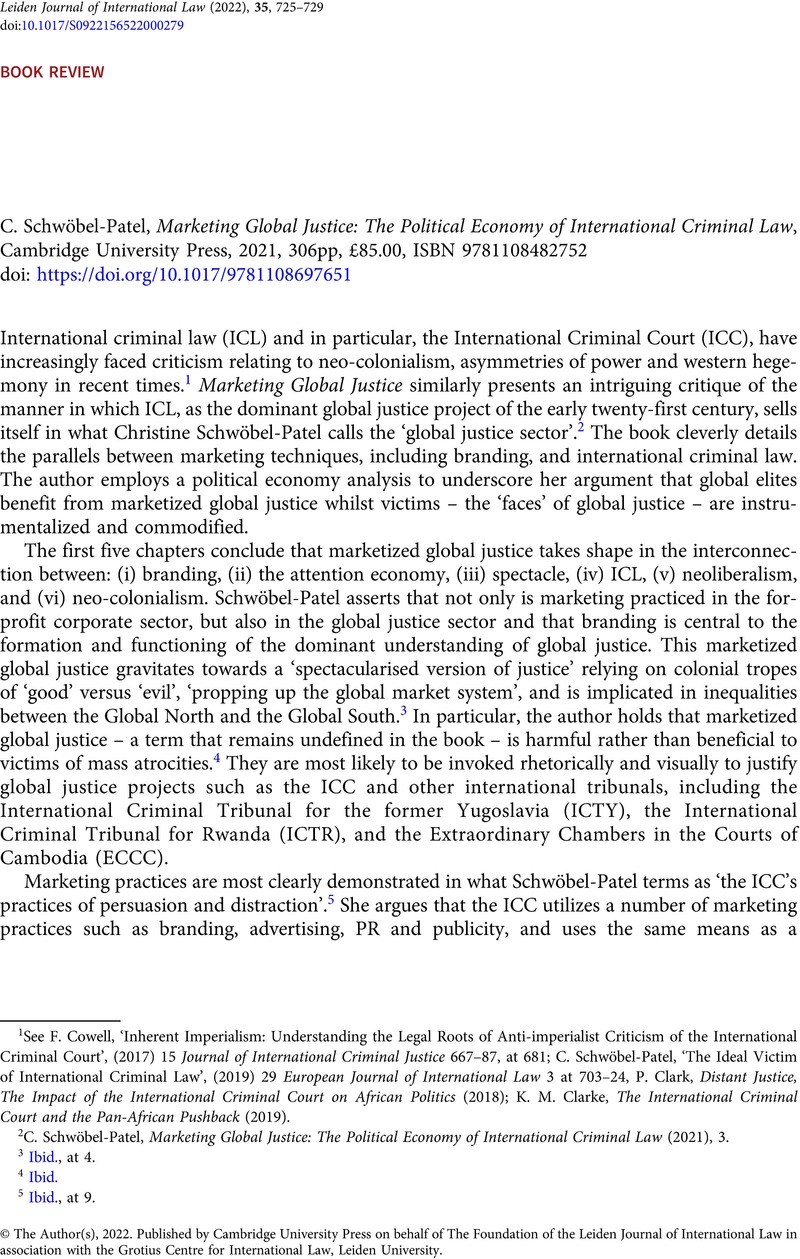No CrossRef data available.
Published online by Cambridge University Press: 24 May 2022

1 See F. Cowell, ‘Inherent Imperialism: Understanding the Legal Roots of Anti-imperialist Criticism of the International Criminal Court’, (2017) 15 Journal of International Criminal Justice 667–87, at 681; C. Schwöbel-Patel, ‘The Ideal Victim of International Criminal Law’, (2019) 29 European Journal of International Law 3 at 703–24, P. Clark, Distant Justice, The Impact of the International Criminal Court on African Politics (2018); K. M. Clarke, The International Criminal Court and the Pan-African Pushback (2019).
2 C. Schwöbel-Patel, Marketing Global Justice: The Political Economy of International Criminal Law (2021), 3.
3 Ibid., at 4.
4 Ibid.
5 Ibid., at 9.
6 M. Hellman, ‘Challenges and limitations of outreach: From the ICTY to the ICC’, in C. De Vos, S. Kendall and C. Stahn (eds.), Contested Justice: The Politics and Practice of International Criminal Court Interventions (2015), 251–71.
7 Schwöbel-Patel, supra note 2, at 18.
8 Ibid., at 58.
9 This was best illustrated in the Kenya situation there were cases of victims and witnesses being contacted by persons who would present themselves as staff members of the ICC in attempts to extract information from them. In this context it was vital for the ICC to ensure that it’s brand and logos were well publicised and visible in order to prevent these types of fraudulent and potentially harmful interactions.
10 Schwöbel-Patel, supra note 2, at 104.
11 Ibid., at 127.
12 Ibid., at 133–9.
13 Our scholarship underscores the need for more victim-oriented approaches in the ICC’s practice and trials. See, e.g., A. Sehmi, ‘Now that we have no voice, what will happen to us?: Experiences of Victim Participation in the Kenyatta Case’, (2018) 16(3) Journal of International Criminal Justice 571; T. R. Kirabira, ‘Elements of aggravation in ICC sentencing: victim centred perspectives’, (2021) 13(3) Amsterdam Law Forum 25.
14 Schwöbel-Patel, supra note 2, at 139.
15 See, for example, this recent infographic posted on the ICC’s Twitter account which depicts victims of crimes under the ICC’s jurisdiction as solely being brown/black people at www.twitter.com/IntlCrimCourt/status/1421453618759274498.
16 Schwöbel-Patel, supra note 2, at 127.
17 Ibid., at 183–92.
18 Ibid., at 192–5.
19 Ibid., at 215.
20 See, for instance, S. Kendall, ‘Donors’ Justice: Recasting International Criminal Accountability’, (2011) 24 Leiden Journal of International Law at 585–606; K. Lohne, Advocates of Humanity: Human Rights NGOs in International Criminal Justice (2019), at 99–124.
21 Schwöbel-Patel, supra note 2, at 258–60.
22 Ibid., at 260–2.